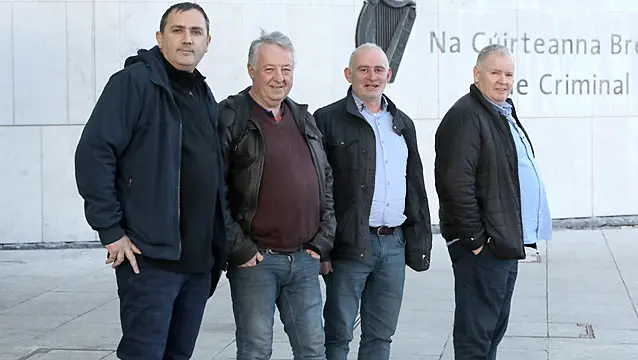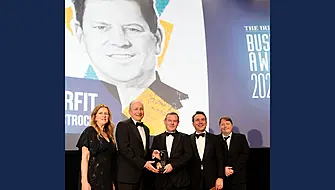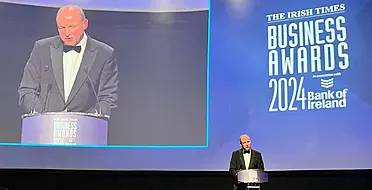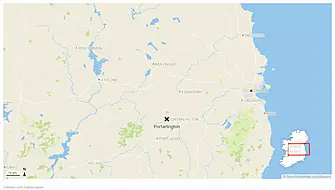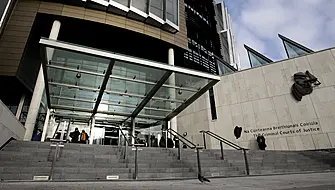Four men accused of being part of a group that attacked and humiliated security guards at a repossessed farm property five years ago were all involved in a common enterprise to ensure the guards did not come back, prosecution lawyers have claimed.
Shortly after 5am on December 16th, 2018, a group of approximately 30 armed men smashed their way into a house at a recently repossessed rural property at Falsk, just outside Strokestown, Co Roscommon, and allegedly attacked four of the security guards present.
It is the State's case that the four defendants were part of that group.
Patrick J Sweeney (44), of High Cairn, Ramelton, Co Donegal; Martin O'Toole (58), of Stripe, Irishtown, Claremorris, Co Mayo; Paul Beirne (57), of Croghan, Boyle, Co Roscommon, and David Lawlor (43), of Bailis Downs, Navan, Co Meath, have pleaded not guilty to 17 charges each at Dublin Circuit Criminal Court.
Each man is charged with false imprisonment and assault causing harm to four security personnel, aggravated burglary, arson of four vehicles which were set alight, criminal damage to the front door of the house, violent disorder, robbery of a wristwatch from one security guard and, finally, causing unnecessary suffering to an animal by causing or permitting an animal to be struck on the head.
On day 39 of the trial, Senior Counsel Anne Rowland continued her closing speech on behalf of the prosecution, concluding on Wednesday afternoon.
She outlined the State's case against each of defendants in detail. She said Mr Sweeney was identified as one of the men captured on video footage allegedly recorded on a body camera worn by one of the security men during the attack.
She said it is the State's case that he is the man on the footage wearing a hunter's hat and wielding a chain saw in one hand and a pickaxe handle in the other.
She said during a search of Mr Sweeney's home, gardaí found a grey hunter's hat, six chainsaws and an iPhone.
Photograph
Analysis of this mobile phone allegedly uncovered a photograph taken on December 14th, 2018, of a van in a driveway identifiable as the property at Falsk.
Counsel said gardaí also found a screenshot of a map, with a timestamp of just after midnight on the night of the attack, showing a route from Donegal to Elfin in Roscommon.
“Does this evidence add up to the defendant being at Falsk or is he the unluckiest man in Ireland with all these coincidences?” Ms Rowland said.
She said that in interview, Mr Sweeney told gardaí he had been made bankrupt and was still in bankruptcy. She said that while “many of the finest people” suffer financial difficulties and become bankrupt, this situation may have affected the defendant and “instilled certain feelings towards banks”.
When Ms Rowland began outlining the case against Mr O'Toole, he interrupted her from the body of the court and said: “Be very careful, every time you mention my name, it’s going to cost you €10,000.”
Judge Martina Baxter told the jury that Mr O'Toole has dismissed his legal team and is now defending himself. The defendant later interrupted Ms Rowland a second time, saying his name was Martin Thomas O'Toole and that he objected to being referred to in any other way.
Ms Rowland told the jury that she understood that this is clearly a stressful situation for all the accused and that she had no issue referring to the accused as the “second defendant”.
A woman, stating her name as Melissa Kelly, told the judge that she wished to object to the use of the term “security guard”. Judge Baxter told her she had no audience but that “everyone gets a chance to speak,” and “your time will come”.
Body-cam footage
Ms Rowland said the second defendant was identified on the security body-cam footage by a garda who knew him from interacting with him in court. She said that texts messages found on his mobile phone were evidence of his involvement in organising events at Falsk.
She said it “may be of some significance” that the accused had loans and had been brought to court over these. She said that in interview he told gardaí that “he doesn’t believe in mortgages, he believes in common law”.
“He has certain ideas that might not be mainstream, but he is entitled to that. It’s a free country in that respect,” counsel said. Some members of the public sitting in the court began laughing loudly at this point and some began clapping.
Ms Rowland said after repeatedly denying he was at Falsk, the second defendant did eventually admit to gardaí that he was present on the night but that he had arrived late. Counsel said this was him trying to distance himself from what happened.
She said his statement that he thought it was going to be “a show of hands” was completely unbelievable in circumstances where everybody was armed.
“He was in throes of it; he was part of the organisation. He knew about the dreadful events and the assaults, the gratuitous humiliation,” she said.
Ms Kelly objected at this point and Judge Baxter told her that she would be cited for contempt of court if there was one more interruption from her.
Ms Rowland said Mr Beirne admitted going to Falsk and smashing in the front door with a sledgehammer. She said his statement to gardaí that the intention was “take back the house peacefully” but that “it just got out of hand” was absolute nonsense.
'Armed to the hilt'
“There was a plan and everybody was armed to the hilt. It was ensured at Elfin that people were armed. Mr Beirne was one of the organisers. He drove them to Falsk. There is incontrovertible evidence that he organised and participated in the events at Falsk,” she said.
She said the evidence against Mr Lawlor was all circumstantial but said it was open to convict someone on the basis of circumstantial evidence alone.
She said that based on analysis of mobile phone masts, it is the State's case that Mr Lawlor travelled with his phone from Dublin to Falsk on the night and was at Falsk during the time of the attack, before he travelled back to Blanchardstown in Dublin.
She said this cell site evidence “is a silent witness...this is scientific; this is evidence that can't be disputed.” She said there was other evidence of messages which showed Mr Lawlor had an extreme dislike of Ian Gordon, the owner of the security company hired to secure the repossessed property and one of the alleged victims.
Ms Rowland said Mr Gordon testified that while he was being attacked on the night, he heard someone say: “Stop it Davey, you're gonna kill him,” and then another man saying: “This is Ian Gordon, ex-UVF.”
Mr Gordon told the jury that he recognised this second voice as the voice of Mr Lawlor.
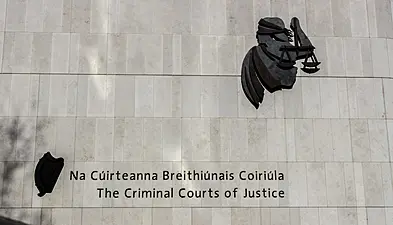
Mr Gordon testified that Mr Lawlor had previously approached him when they were both working security at an event in Dublin and told him: “You were at the repossession of my house in Navan.” Mr Gordon also claimed that he subsequently heard Mr Lawlor speaking alongside Ben Gilroy at the repossession of a house in Dublin.
She told the jury it is the prosecution’s case that all four accused were involved in a common enterprise on the night in question, which was to get rid of the security men at Falsk.
She said the group wanted to ensure the security men would not come back and achieved this by perpetrating violence and humiliating them and burning their vehicles. She said that all the actions by each member of the group are attributable to each of them.
Closing speeches on behalf of the defendants are set to begin on Thursday morning.
